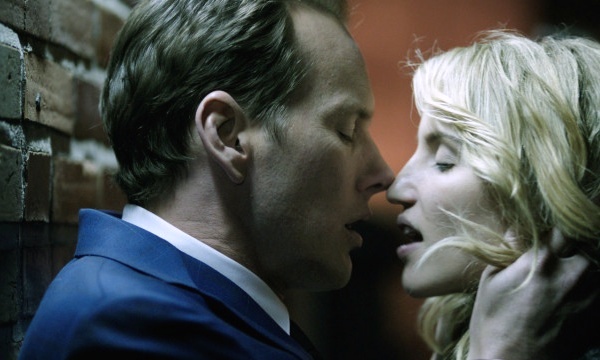Michael C here to look at a trio of dark films that premiered at Sundance. What would Sundance be without some downbeat character studies? Every festival gets its share of films charting the process by which self-destructive people make a shambles of their lives. Some of them are utterly engrossing and have the audience hanging on the protagonist's every move. Many of them are a chore, dragging the audience through fifty variations of misery to no clear purpose. The type of film where you tip your hat to the artistry and to the gumption it took to get it made, while silently resolving that you never need subject yourself to that again.
(I Smile Back, James White and Patrick Wilson in Zipper after the jump)

Adam Salky's I Smile Back is, I'm afraid, closer to the second type of film. Sarah Silverman deserves the raves she is winning as Laney, a wife and mother with a home life that should make her at least minimally happy, but which does nothing to quiet her raging demons. Silverman plays a woman with deep psychic scars that cause her to see nothing but the potential disaster underneath the placid surfaces of suburbia. When husband Josh Charles brings home a dog all she can do is dwell on the pain a decade down the road when the dog dies. At the start of the film she is struggling desperately to quiet these demons, downing wine in panicky gulps every time no one is looking, carrying on a coke-fueled affair with a family friend, lashing out at minor incidents, like when she berates the mother of another child who tells her son that the Thanksgiving story is bullshit.
Silverman is equal to every nuance on Laney's downward spiral. I'd call the performance a revelation but her talent has been apparent for years to anyone paying attention. The problem is I Smile Back never manages to find much meaning in her struggles. There are some moving standalone moments, like when Silverman watches her son succeed at a piano recital and a succession of revelations play across her face, relief that her weaknesses have not yet destroyed her offspring as well the crushing realization that this life is rapidly slipping away from her, but these moments don't build on one another or lead anywher illuminating. Eventually I Smile Back settles into a predictable pattern of Silverman trying and failing to get her act together for a series of second chances. On some level a great performance is its own reward but you can't help but wish that Silverman's character could be excised and transferred to a film that found more to do with her.

It's tough to nail down why Josh Mond's James White is so much more effective when it is made up of so many of the same basic parts as I Smile Back. Both feature force-of-nature performances as self-destructive wrecks with abandonment issues, in this case grab-you-by-the-throat work from Christopher Abbott. We watch as both protagonists corrode their relationships with outbursts and unreliability. For James White's it's his mother (Cynthia Nixon, terrific) who wants her overgrown child to stop living on her sofa and get his act together. Yet, where I knew everything I Smile Back had to say by the halfway point, James White kept me on edge right up to the last frame.
A big part of that success is the way James White finds a live-wire visual style to match its title character's erratic behavior. The camera barrels through scenes in a perfect simulation of James' utter lack of impulse control and its use of tight closeups is an effective approximation of his monstrous selfishness. The film begins with White using his father's funeral as an excuse to fly off the handle and avoid responsibility, and the movie lets us know this is the latest in a long succession of such excuses. We follow him as the twenty-something White begins an ill-advised relationship with a high-school student, tanks a job interview, lashes out with violence at the slightest provocation, and generally quakes at the prospect of adult responsibility when faced with his mother's failing health. The most impressive thing about Mond's feature film debut is that he makes us care for the title character despite ourselves, finding sympathy for a person we would go out of our way to avoid in real life. It all comes together in a climax that has White surrendering his close up to another character for an extended sequence which blindsides us with its power.

Like James White, Mora Stephen's Zipper takes care not to let the film's visuals fall by the wayside, but goes overboard in the opposite direction, pumping a simple story full of cinematic steroids until it ends up making some good actors look very silly indeed. Patrick Wilson plays a rising star attorney, a moral crusader with political aspirations who is riding high after taking down a high profile corrupt politician. When his case crosses path with an elite escort service, the upstanding gentleman finds himself uncontrollably drawn to the risk and power of hiring sex workers, quickly following down a rabbit hole of sex for pay.
Zipper has the admirable goal of laying bare the hypocrisy of entitled, powerful white guys who can't keep it in their pants, but the film's execution is so laughably overwrought that it drowns out any insight into the subject. Stephens bangs on the sex as addiction angle with a sledgehammer, using frantic, Requiem for a Dream cutting when it looks like Wilson might not get to spend every possible second having sex with prostitutes. Eventually the whole thing crosses into Reefer Madness territory. You bang one prostitute and you are HOOKED FOR LIFE! Lena Headey plays Wilson's wife as a variation on her manipulative power broker from Game of Thrones, somehow coming off more over-the-top in this ostensibly realistic context than in the one where she costars with dragons and warlocks. Over-the-top being the key phrase for Zipper as a whole.
Grades I Smile Back: C +; James White: B+; Zipper: D